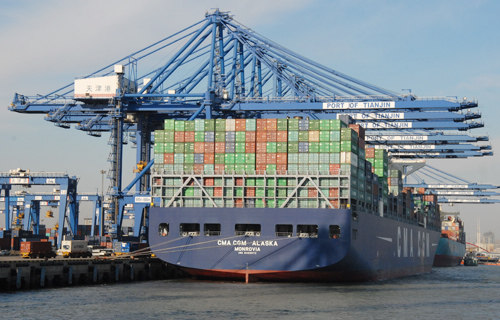|
 |
|
TRADING GIANT: A large container cargo ship stops at Tianjin Port in north China. China wields extensive influence on global trade and world economy (HU ZHIQIANG) |

As the world's economic growth slows, China finds itself confronting the twin challenge of the "re-industrialization" of developed countries and the shift of traditional labor-intensive industries to cheaper emerging developing nations. What are China's advantages and what strategies can the country adopt to remain competitive? Mei Xinyu, an associate research fellow with the Chinese Academy of International Trade and Economic Cooperation under the Ministry of Commerce, shared his views in an article for Beijing Review. Edited excerpts follow:
As the world's largest trading nation, its largest exporter and second largest importer, China wields extensive influence on global trade and the world economy. China's advantages of course lie not only in the stable foreign trade policy decided by the recently held Central Economic Work Conference, but also in the strength and resilience of a broad-based and fast-growing economy.
The country's primary advantage comes from its stable macro-economy. The Chinese economy has generally realized a soft landing following a period of extremely rapid economic growth. While China did confront severe inflationary pressures in 2011, as well as a brief drop in the value of the renminbi exchange rate, China's financial status is the most stable of the world's major economies and leading emerging markets. While China still faces risks related to local financing platforms and potential non-performing loans in the banking sector, the overall assets status of the Chinese banking system is still sound, and China's rate of inflation remains lower than India's and those of other hot emerging markets by several percentage points.
Although pressure for renminbi depreciation continues to accumulate, the yuan is still stable compared with most emerging market currencies, many of which are now nearing currency crisis levels.
Among the largest emerging economies—BRICS—in the first nine months of 2011, only China's yuan appreciated by more than 3 percent in the inter-bank foreign exchange market. In the other four BRICS countries, the Russian ruble depreciated by 4.06 percent, the Brazilian real lost 8.01 percent of its value, while the Indian rupee and South African rand devalued by 8.5 percent and 15.7 percent, respectively.
In September alone, the Brazilian real depreciated by 16 percent against the U.S. dollar. The Brazilian central bank, which has worked for years to curb the appreciation of the real, had to announce, on September 22, that it was selling $2.75 billion worth of the dollars to counteract the depreciation of the real. Since July 2011 the Indian rupee has depreciated by more than 20 percent.
The stability of China's macro-economy makes the country's industries more competitive. Corporations are keen to invest in China because they face much lower risks in terms of long-term strategic planning.
While currency depreciation in emerging developing countries such as Viet Nam and India is often seen as giving their manufacturing industries an advantage over China, currency depreciation alone does not necessarily make a country's exports more competitive.
| 